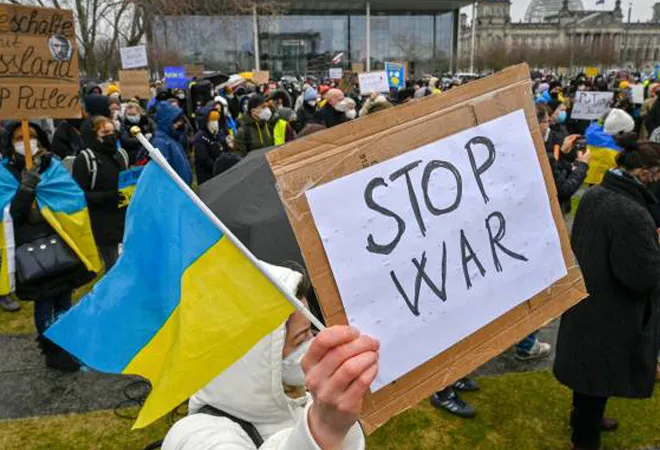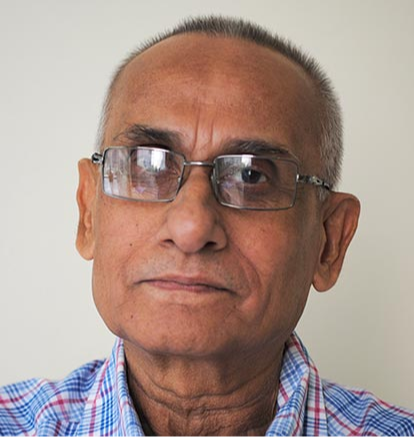-
CENTRES
Progammes & Centres
Location
The priority of the international community should be to broker peace and end the Ukraine war before it takes a turn for the worse.

This brief is a part of The Ukraine Crisis: Cause and Course of the Conflict.
The Greeks were much closer to reality in thinking that persistence of war was embedded in enduring human nature than the 18th century British scientist such as Joseph Priestly or American Philosopher such as Thomas Paine who believed that expanding commerce could extirpate war. No wonder in 1968, Will and Ariel Durant found only 268 years free of war in the past 3,421 years. Thucydides summarily found the causes of war in ‘honor, fear, and interest’. In modern times, as Donald Keagan avers in his book “On the Origins of War and the Preservation of Peace”, historians found nations going to war not because of any specific issue, ‘but to maintain their power, before they find themselves so isolated, so impotent that they have to accept a subordinate position within an international system dominated by their adversaries. That is why the fifth principle of Morgenthau’s six principles of realism urged nations to be ‘capable of pursuing policies that respect the interests of other nations.’ Richard Haass’s new book, “War of Necessity, War of Choice”, in a way, reinforces the same view.
The above paragraph sufficiently hints at the cause of the present war in Ukraine. To put things more clearly, if a single underlying cause is to be identified, it is the US policy, ever since the breakdown of the erstwhile Soviet Union, more so since the rise of Putin, to ostracise Russia from the great power system on which the world politics is founded. Such a policy goes against the very essence of realpolitik and is based on an incorrect mixture of morality and power. Professor John Mearsheimer has been vehemently warning against such a policy for a long time but in vain. Long before him, in his 1995 book, Professor Donald Kagan had warned the Washington bureaucracy about the ever-changing character of power distribution at the global level when he said, “…nor should Russia’s current difficulties blind us to its inherent strength and the certainty that, sooner or later, it will emerge on the world scene as a great power, with desires and goals of its own…”. Indeed, amongst such desires and goals the minimum is a sense of security.
No one can predict if Putin is interested to revive the Soviet Union of the past (he is credited to have said, ‘one who does not miss the Soviet Union has no heart, but who wants it back has no brain’) or whether he wants to pounce on the Baltic states after occupying Ukraine.
Undoubtedly, the North Atlantic Treaty Organisation’s (NATO) policy of expanding to the east was making Russia uneasy. Russia was vehemently opposed to including Georgia and Ukraine in NATO’s Membership Action Plan (MAP). After the Bucharest Summit of 2008, a CRS Report for Congress noted that while Ukraine’s leaders desired NATO membership, a vast majority (60-70 percent) of the population were opposed to the idea. Not only ethnic Russians, but “a sizeable proportion of ethnic Ukrainians appear to be oriented more towards Russia.”
But things began to change since then. Russian protégé Yanukovych’s intervention in Ukraine, Russian control of the provinces of Donetsk and Luhansk, Alexander Lukashenko’s reckless authoritarian regime in Belarus, backed by solid Russian support, were possible factors changing the orientation of the Ukrainians so much so that a survey conducted by International Republican Institute’s Centre for Insights in Survey Research (CISR) in November 2021 found that 58 percent of Ukrainians chose the EU as the best option for joining an international economic union and 54 percent voted to join NATO .
Developments such as increasing positivity towards NATO membership of the Ukrainians and the strong civil society movement against Lukashenko regime made Russia nervous about its capacity to hold its periphery. No one can predict if Putin is interested to revive the Soviet Union of the past (he is credited to have said, ‘one who does not miss the Soviet Union has no heart, but who wants it back has no brain’) or whether he wants to pounce on the Baltic states after occupying Ukraine. However, he has a legitimate claim to security and to be treated as a great power. French President Macron, after meeting Putin and Zelensky just before the conflict started, drew attention to the fact that Russia had a security problem which needs to be addressed. But for some reason it was bypassed. At the same time, it cannot be overlooked that much of Russia’s security problem is its own creation.
This war basically was unnecessary. Even now, Ukraine is saying that there is no possibility of her joining NATO while Russia is publicly claiming (whether honestly so we do not know) that it has no plans to bring about a regime change in Ukraine. Therefore, Russia’s war aims remain unclear. And that makes it very dangerous because it is a specific war without any specific and specified goals. But the Russian attack upon Ukraine continues unabated bringing in its trail a huge humanitarian calamity and undoubtedly making Russia the aggressor.
The economic impact of the war will be deep and far reaching affecting every household in every country, ranging from Europe to Asia and Africa.
But the war is not only affecting the Russians and the Ukrainians. Today’s globalised world is also making this so far local war global in its effect. The world was basically on a development mode, already deeply and negatively affected by the long pandemic. The war has completely shifted the world from the possibility of nations aspiring for a post-pandemic recovery to the starkness of destruction and destitution. The economic impact of the war will be deep and far reaching affecting every household in every country, ranging from Europe to Asia and Africa. The US is now sending boots to the Baltic states to defend NATO. Is there any guarantee that the world is not gradually inching towards a European, and finally, a global conflict, or the ‘fog of war’ will not confound sensible decision-making? The urgent need is to stop the war; to prevent the possibility that once a nuclear power violates the sovereignty and territorial integrity of a state, it becomes irreversible, or that it inevitably leads to a nuclear conflagration. The continuity and perhaps inevitable expansion of the war will end all hopes of bringing millions out of poverty or implementing the promises on preventing climate change. The fulfillment of such goals requires a minimally consensual and peaceful world.
The United Nations (UN) has always been an ineffective peacekeeper when it comes to conflicts and wars involving great powers. Therefore, a lot of responsibility devolves on individual countries not directly involved in the conflict to pressurise the belligerents to bring the war to an end. Germany and France are reportedly still trying to do that.
Two best-placed countries in the world that could help bring about negotiated settlement happen to be China and India. India has good relations with all the stakeholders. What it has neglected so far must be done without further delay: It must do its utmost in persuading both Putin and Biden to find workable peace rather than calculating whether the conflict will indirectly strengthen the QUAD. China, which admittedly has a ‘no limits’ relations with Russia, can hardly neglect its vital relations with both the US and Europe. It is not the time for her to calculate how much it can gain in getting gas from Russia cheaper. It has sensibly announced Ukraine to be a ‘bridge’ between the West and Russia. It must work on that idea rather than issuing heterogeneous statements. For both, China and India, building images as emerging global power is less important than striving for peace so that they can continue on their path towards development. The war presents an opportunity for them to show that their voice really matters and that as ‘developing countries’ they can effectively hold and enforce a middle ground. In fact, it can also bring India and China closer. But then, time is running out.
The views expressed above belong to the author(s). ORF research and analyses now available on Telegram! Click here to access our curated content — blogs, longforms and interviews.

Professor in Political Science, Calcutta University (Retired 2008). Formerly Dean, Faculty of Arts, Calcutta University; Visiting Fellow in Political Science and Associate, Committee on South ...
Read More +